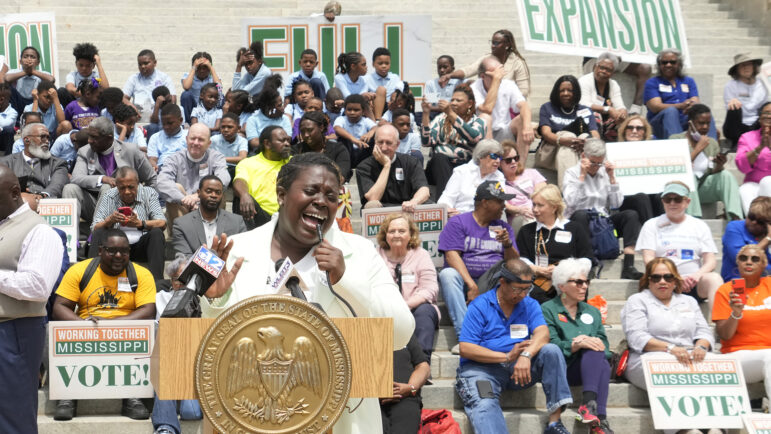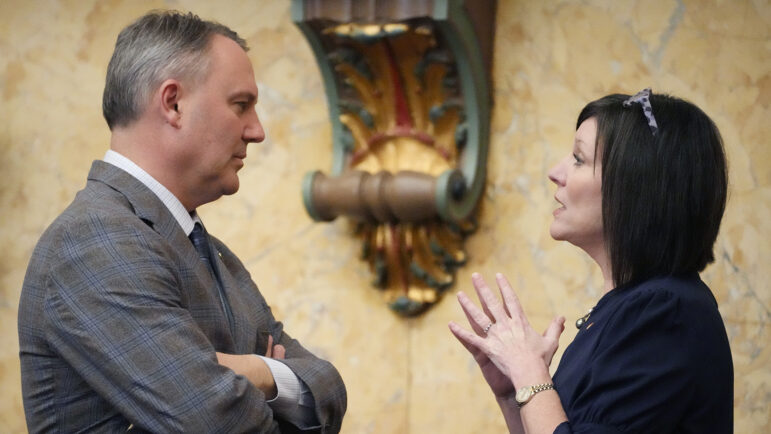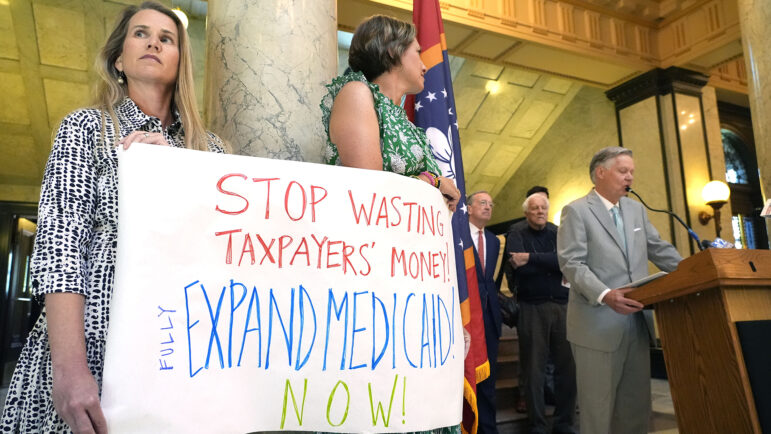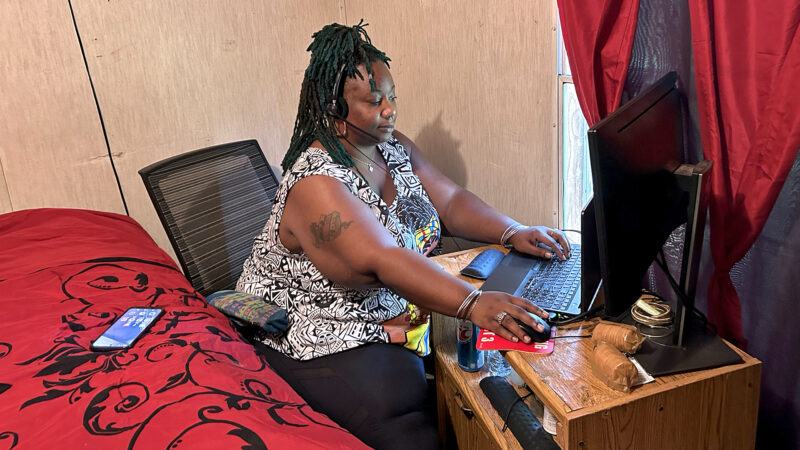‘Stupidity of politics’: Medicaid expansion effort dies in Mississippi
Lakeisha Preston logs into her work computer in her home on April 26, 2024, in New Hebron, Mississippi. Preston helps people enroll in Medicaid but cannot do so herself because she falls into the coverage gap in Mississippi. (Gulf States Newsroom)
In the bedroom-slash-office of her mobile home in New Hebron, Mississippi, Lakeisha Preston logs into work on her desktop computer. She doesn’t have to wait long for a call to come in — and they all start the same.
“Thank you for calling the marketplace. My name is Lakeisha, how can I assist you today?” she says, affecting the bright and cheery voice anyone who’s ever worked in customer service would instantly recognize. “Oh, you’re needing help about Medicaid coverage? I can help you with that. Can I have your first and last name?”
Preston works at a federal Medicaid call center. Every day, she helps people enroll in Medicaid in other states that have adopted Medicaid expansion — a provision in the Affordable Care Act passed more than a decade ago that expands coverage for more low-income Americans.
But even though her job is to assist people with incomes similar to — or sometimes more than — hers get Medicaid coverage, she doesn’t qualify because Mississippi is one of 10 states that has refused to adopt Medicaid expansion. Preston falls into what’s known as the coverage gap — she makes too much for Medicaid coverage but too little to afford private insurance premiums.
Preston said she loves to help people, but knowing she would qualify for Medicaid in another state is tough medicine to swallow each workday.
“It sucks,” she says. “It really sucks to know that a person in a different state, in a higher living wage situation, can get Medicaid, and I work full time and can’t get it.”

A recent report from the Commonwealth Fund, a health care research group, showed the state’s health system performance is the worst in the country, especially for Black people. It also found that increasing health coverage is the best way to improve people’s health.
This year, for the first time, Mississippi lawmakers took a serious look at expanding Medicaid. The Republican-led state saw separate proposals from both the House of Representatives and the State Senate, which could have extended coverage to 200,000 more low-income residents — including the 74,000 people in the coverage gap.
Legislators, however, couldn’t come together on a compromise bill. The main point of contention revolved around a work requirement. Republicans in the State Senate were adamant that anyone who wants health benefits has to work a minimum number of hours to qualify. But the federal government would have to approve an expansion plan with a work requirement, something the Biden administration hasn’t done. That disagreement killed the proposal.
Many in the coverage gap, like Preston, do work — they just can’t afford insurance. Preston is also a single mom, and her son, who has ADHD, is on Medicaid, so his medicine is covered. But hers isn’t. She has high blood pressure and high cholesterol — medication she says she has to take every day or she’ll die. Her job at the call center offers health insurance, but it comes with a $2,500 deductible.
“I might as well not have it,” Preston says. “Or I might as well just pay out of pocket for something else.”
Come for the savings, stay for the salvation
Preston said that cost often keeps her from going to the doctor and that can lead to a whole host of other problems.
“I can’t tell you the number of patients who I see who come in with advanced disease who have full-time jobs,” said Dr. Roderick Givens, a radiation oncologist and board chair of the Mississippi State Medical Association. “Plain and simple — that’s the coverage gap. The reason they’re coming in with advanced disease is they haven’t seen a physician in years. They can’t afford it. They don’t have coverage.”
Givens and the state’s medical association fully support Medicaid expansion. He said it’s long overdue, especially since the federal government would pay for the vast majority of it — and most Mississippians support it.
“Why does that not translate when it comes to policy and a third party really willing to fund 90-to-100% of that cost? It’s just completely insane,” Givens said before supplying his own answer: “It’s called the stupidity of politics, period.”

Mississippi’s Republican House Speaker Jason White also believes politics have gotten in the way of expansion in the past.
“It’s President Obama’s signature piece of legislation. No denying it. It’s known as Obamacare,” White said. “So there are a lot of political dynamics centered around it that probably never allowed it to get off the ground.”
The life cycle of Medicaid expansion in the Gulf South does seem to be dependent on politics. In Alabama this year, expansion language was included in an early draft of a casino and gambling bill and was widely supported by Democratic lawmakers. But it was later removed and didn’t receive any more discussion in the Republican-led legislature.
Louisiana adopted expansion in 2016 under Democratic Governor John Bel Edwards. But the newly-elected Republican Governor Jeff Landry has proposed retroactively implementing a work requirement for people covered by Medicaid — though he hasn’t introduced the idea of repealing expansion.
White said once expansion is on the books and states see the benefits, legislators don’t go backward and undo it. And, he said, Mississippi’s business community supports expansion, which was a key factor behind this year’s serious discussion.
“I kidded some of my fellow Republicans, I said, ‘Look, come for the savings, if you will, and then you can stay for the salvation and the good things that it does to improve people’s lives,’” White said. “If you can’t get there because it’s the right or compassionate thing to do to help these individuals, get there because it makes sense from a business standpoint.”

Death of Medicaid expansion
For a moment, it seemed lawmakers had managed to find a compromise proposal that covered individuals up to 138% of the federal poverty level — just over $20,000 for an individual — and had a work requirement of 100 hours per month, or around 25 hours per week.
But even if it was passed, it still faced additional hurdles. If it didn’t get federal approval for the work requirement, expansion would not go into effect. In a last-ditch attempt, White offered a new proposal — a referendum that would put two questions on the ballot for Mississippi residents to vote on in November: Should Mississippi expand Medicaid? If so, should the expansion include a work requirement?
Mississippi Governor Tate Reeves also weighed in on X.
“Today, the Mississippi House and Senate will vote on FULL Obamacare Medicaid Expansion. Up to 138%. Just like Obama-Biden wanted!” Reeves posted.
He urged Republicans in the state legislature to vote against the plan.
Whether or not Reeves would have vetoed legislation is a mystery for another day — which may come in next year’s legislative session. Republican Lt. Gov. Delbert Hosemann said White’s proposal to put the question to the voters “was not well received” by Senate leaders, and that passing Medicaid expansion would be the first order of business during the 2025 legislative session.
White described himself as an optimist, and he said despite the outcome of this year’s legislative session, this isn’t the end of efforts to expand Medicaid in Mississippi.
“I think the drumbeat just continues to grow and get louder now that our business community is on board,” he said. “I think you’re only going to see more and more and more Mississippians say, ‘Why aren’t y’all being smart? Why don’t y’all do this? This is the right thing to do.’”
This story was produced by the Gulf States Newsroom, a collaboration between Mississippi Public Broadcasting, WBHM in Alabama, WWNO and WRKF in Louisiana and NPR. Support for health equity coverage comes from The Commonwealth Fund.
Senate approves cuts to NPR, PBS and foreign aid programs
The Senate voted to approve a $9 billion rescission package aimed at clawing back money already allocated for public radio and television.
Gulf Coast braces for flooding as storm builds into possible tropical depression
The weather system moving across the Florida Panhandle on Wednesday was showing a greater chance of becoming a tropical depression as it moves toward the northern Gulf Coast.
White House says U.S. fentanyl overdose programs will be funded ‘in increments’
CDC staffers worry $140 million in grants could fail to reach state and local overdose programs. The White House officials say the dollars will arrive but won't say when.
Thousands of veterans get help from Congress to save their homes from foreclosure
A bipartisan Congress has come to the rescue of vets at risk of losing their homes, after administrations from both parties tore up VA safety nets for homeowners.
Clawing back foreign aid is tied to ‘waste, fraud and abuse.’ What’s the evidence?
As the Senate prepares to vote on a bill to rescind $40 billion in promised foreign aid, critics of the measure say a thorough governmental review of targeted programs did not actually take place.
How a third parent’s DNA can prevent an inherited disease
An experimental technique that patches defective DNA with donated genetic material helped families at risk of passing rare illnesses to their children.








